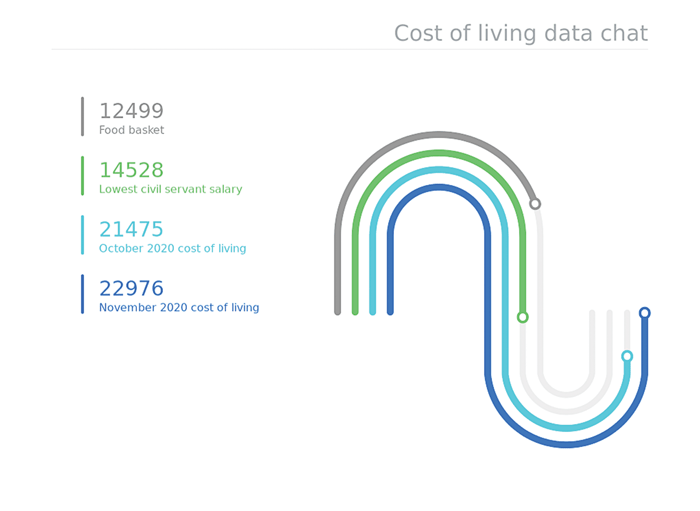
BY MTHANDAZO NYONI
THE cost of living for a family of six increased by 5,66% to $22 976 in November, underpinned by a rampaging parallel market exchange rate, according to the Consumer Council of Zimbabwe (CCZ).
In October, the figure, as measured by the CCZ, stood at $21 745.
The $22 976 is way above average incomes in Zimbabwe, where the lowest civil servant earns about $14 000 per month.
Thousands more employed in fragile industries earn much less than this, even going for months unpaid as firms struggle to survive a difficult economic crisis.
While the introduction of a foreign currency auction system in June helped defuse a year-long parallel market rage, demand for United States dollars has increased this festive season, pushing parallel market rates to more than US$1:$130 yesterday, from about US$1:$40 in January.
Because retailers peg their prices to prevailing black market exchange rates, hard-pressed Zimbabwean consumers face one of their toughest Christmas holidays in a decade.
The CCZ yesterday attributed the rise to hyperinflation and a volatile exchange rate.
- Chamisa under fire over US$120K donation
- Mavhunga puts DeMbare into Chibuku quarterfinals
- Pension funds bet on Cabora Bassa oilfields
- Councils defy govt fire tender directive
Keep Reading
It said during the period under review, the food basket increased by $772 to $12 499, while the price of detergents decreased by 8,86% to $992.
The CCZ said prices of almost all basic commodities and non-food items like electricity increases during the period.
“The increase in the total figure of the basket is attributed to the price adjustments … especially on the basic food items, due to inflation; influence of the exchange rate and in exceptional cases, the parallel market,” the CCZ said.
Year-on-year inflation reached a post dollarisation zenith of 837,53% in July, much to the chagrin of authorities who then instituted a raft of measures to douse the flame.
In November, inflation eased to 401% after one of the sources of fuelling inflation, the forex exchange parallel market, was tamed when the central bank intensified a clampdown on mobile money agents and other digital money transfer platforms.
Government suspended trading on the Zimbabwe Stock Exchange in June, accusing the bourse of fuelling inflation, before reopening it in August.
It also launched a forex trading stock exchange in Victoria Falls to tame the tide, which went live June.
In its report, the CCZ said lockdowns instituted by government from March affected spending patterns in Zimbabwe.
“The further relaxation of the lockdown regulations has resulted in an increased movement of consumers, activities on the market place and change of consumer behaviour patterns emanating from the eroding of consumer buying power,” it said.
“The market has not fully adjusted to the displaying of prices in both United States dollar and Real Time Gross Settlement as provided for by Statutory Instrument 185. Therefore, we encourage consumers when they are buying in US$ to be knowledgeable of the prevailing weekly auction exchange rate to avoid being overcharged,” the survey added.
The consumer lobby group urged consumers to shop conscientiously and to always buy certified products.
Where the products are not certified, consumers must exercise their right to information by carefully examining if the products they are purchasing are well labelled, packaged and provided with vital information which includes manufacturing expiry dates and ingredients used in the make-up of the products, said the CCZ.
The consumer lobby group conducts a survey every week.
The total cost of the food basket and the price of each commodity are arrived at by averaging prices gathered from retail outlets throughout the country.
Government recently awarded civil servants a 40% salary raise, which saw the lowest paid employee receiving $14 528 per month, while the highest earner gets $18 237.
Civil service pay hikes are usually followed by a wave of price increases.











